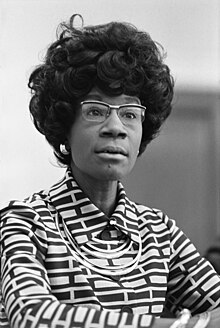
Back شيرلي تشيزوم Arabic شيرلى تشيشولم ARZ شرلی چیزم AZB Shirley Chisholm Catalan شێرلی چیسھۆڵم CKB Shirley Chisholmová Czech Shirley Chisholm Danish Shirley Chisholm German Shirley Chisholm Esperanto Shirley Chisholm Spanish
Shirley Chisholm | |
|---|---|
 Chisholm in 1972 | |
| Secretary of the House Democratic Caucus | |
| In office January 3, 1977 – January 3, 1981 | |
| Leader | Tip O'Neill |
| Preceded by | Patsy Mink |
| Succeeded by | Geraldine Ferraro |
| Member of the U.S. House of Representatives from New York's 12th district | |
| In office January 3, 1969 – January 3, 1983 | |
| Preceded by | Edna Kelly |
| Succeeded by | Major Owens |
| Member of the New York State Assembly | |
| In office January 1, 1965 – December 31, 1968 | |
| Preceded by | Thomas Jones |
| Succeeded by | Thomas R. Fortune |
| Constituency | 17th district (1965) 45th district (1966) 55th district (1967–1968) |
| Personal details | |
| Born | Shirley Anita St. Hill November 30, 1924 Brooklyn, New York, U.S. |
| Died | January 1, 2005 (aged 80) Ormond Beach, Florida, U.S. |
| Resting place | Forest Lawn Cemetery |
| Political party | Democratic |
| Spouses |
|
| Education | |
Shirley Anita Chisholm (/ˈtʃɪzəm/ CHIZ-əm; née St. Hill; November 30, 1924 – January 1, 2005) was an American politician who, in 1968, became the first Black woman to be elected to the United States Congress.[1] Chisholm represented New York's 12th congressional district, a district centered in Bedford–Stuyvesant, Brooklyn[a] for seven terms from 1969 to 1983. In 1972, she became the first Black candidate for a major-party nomination for President of the United States and the first woman to run for the Democratic Party's presidential nomination. Throughout her career, she was known for taking "a resolute stand against economic, social, and political injustices,"[2][3][4][5] as well as being a strong supporter of black civil rights and women's rights.[6][7][8][9]
Born in Brooklyn, New York, she spent ages five through nine in Barbados, and she always considered herself a Barbadian American. She excelled at school and earned her college degree in the United States. She started working in early childhood education, and she became involved in local Democratic Party politics in the 1950s. In 1964, overcoming some resistance because she was a woman, she was elected to the New York State Assembly. Four years later, she was elected to Congress, where she led the expansion of food and nutrition programs for the poor and rose to party leadership. She retired from Congress in 1983 and taught at Mount Holyoke College while continuing her political organizing. Although nominated for the ambassadorship to Jamaica in 1993, health issues caused her to withdraw. In 2015, Chisholm was posthumously awarded the Presidential Medal of Freedom.
- ^ Freeman, Jo (February 2005). "Shirley Chisholm's 1972 Presidential Campaign". University of Illinois at Chicago Women's History Project. Archived from the original on November 11, 2014.
- ^ Fraser, Zinga A. (2022). "Beyond the Symbolism: Shirley Chisholm, Black Feminism, and Women's Politics". In Giles KN; Rachel Jessica Daniel; Laura L Lovett (eds.). It's Our Movement Now: Black Women's Politics and the 1977 National Women's Conference. University Press of Florida. pp. 175–184. doi:10.5744/florida/9780813069487.003.0014. ISBN 978-0-8130-6948-7. Retrieved August 22, 2023.
- ^ Curwood, Anastasia (2015). "Black Feminism on Capitol Hill: Shirley Chisholm and Movement Politics, 1968–1984". Meridians. 13 (1): 204–232. doi:10.2979/meridians.13.1.204. ISSN 1536-6936. JSTOR 10.2979/meridians.13.1.204. S2CID 142146607.
- ^ Winslow, Barbara (April 27, 2018). Shirley Chisholm: Catalyst for Change, 1926–2005 (1 ed.). Routledge. doi:10.4324/9780429493126. ISBN 978-0-429-49312-6. S2CID 259517966.
- ^ Guild, Joshua (2020), "11 To Make That Someday Come: Shirley Chisholm's Radical Politics of Possibility", Want to Start a Revolution?, New York University Press, pp. 248–270, doi:10.18574/nyu/9780814733127.003.0015, ISBN 978-0-8147-3312-7, retrieved August 22, 2023
- ^ Cite error: The named reference
:1was invoked but never defined (see the help page). - ^ "Shirley Chisholm, "For the Equal Rights Amendment," Speech Text". Voices of Democracy. Retrieved August 22, 2023.
- ^ Curwood, Anastasia C. (2023). Shirley Chisholm: Champion of Black Feminist Power Politics. The University of North Carolina Press. doi:10.1353/book.109689. ISBN 978-1-4696-7119-2. S2CID 259517966.
- ^ Chisholm, Shirley (1983). "Racism and Anti-Feminism". The Black Scholar. 14 (5): 2–7. doi:10.1080/00064246.1983.11414282. ISSN 0006-4246. JSTOR 41067044.
Cite error: There are <ref group=lower-alpha> tags or {{efn}} templates on this page, but the references will not show without a {{reflist|group=lower-alpha}} template or {{notelist}} template (see the help page).